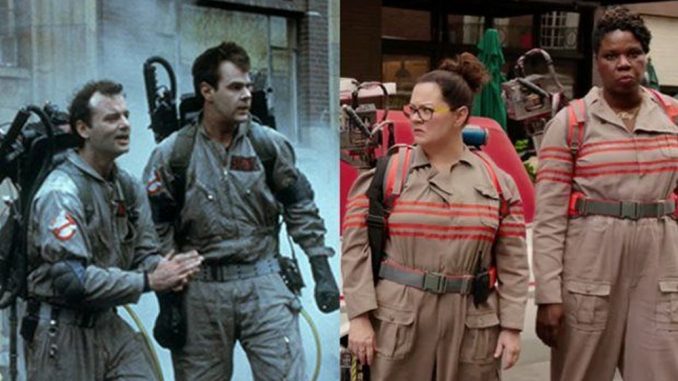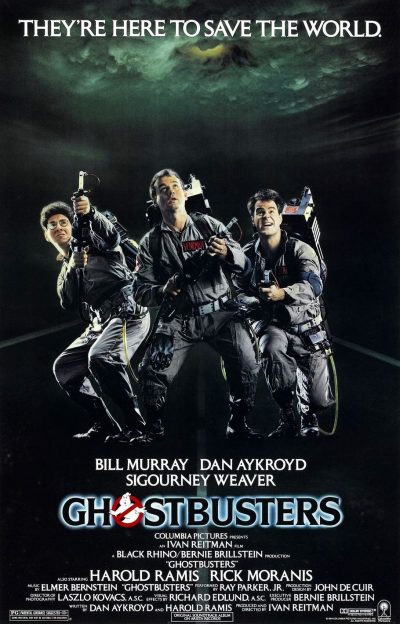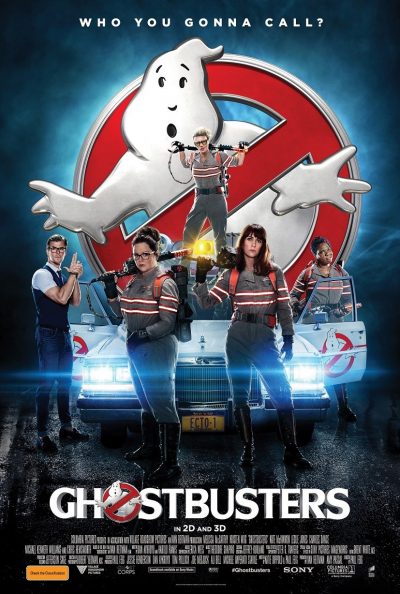
Ghostbusters (1984)
Rating: B
Dir: Ivan Reitman
Star: Bill Murray, Harold Ramis, Dan Aykroyd, Sigourney Weaver
Pop culture is sometimes absorbed almost by osmosis; you can be aware of something without having ever experienced it. For instance, I have never knowingly heard Let It Go. But I know what it is, from where it comes, and can “get” references to it. To my surprise, it seems the same goes for the original version of Ghostbusters. I’m not sure I had ever seen the film in its entirety before sitting down to watch it for the purposes of this review. I was certainly well aware of it, and there were chunks I definitely remembered. Yet there were also whole scenes, such as the one where the Ghostbusters are locked up in prison, which rang no bells at all. It’s quite possible I’d surfed randomly across it in fragments, without ever seeing it all, in the same way I still haven’t seen The Empire Strikes Back from beginning to end.
 I could still have provided a fairly accurate summary of the plot. Paranormal researchers get tossed from their academic sanctuary, go into business privately and end up saving New York from a demonic entity in the shape of a giant marshmallow-man. I’m not sure whether that storyline is brilliance or stupidity, though the two are not mutually exclusive. As often, it’s the execution that matters, and in particular casting which is as near-perfect as dammit. The main dynamic has Ramis as super-serious scientist Egon Spengler, countered by Peter Venkman, a man who according to Dean Yeager seems “to regard science as some kind of dodge or hustle.” He is first seen blatantly fabricating results while using Zener cards to test subjects for ESP, telling a pretty girl she’s right even when she “sees” a symbol that’s not even in Zener cards (a figure eight, should you care). In terms of introducing the character, it’s perfect, and it’s the interaction between the pair, along with colleague Ray Stantz (Aykroyd), which drives the film.
I could still have provided a fairly accurate summary of the plot. Paranormal researchers get tossed from their academic sanctuary, go into business privately and end up saving New York from a demonic entity in the shape of a giant marshmallow-man. I’m not sure whether that storyline is brilliance or stupidity, though the two are not mutually exclusive. As often, it’s the execution that matters, and in particular casting which is as near-perfect as dammit. The main dynamic has Ramis as super-serious scientist Egon Spengler, countered by Peter Venkman, a man who according to Dean Yeager seems “to regard science as some kind of dodge or hustle.” He is first seen blatantly fabricating results while using Zener cards to test subjects for ESP, telling a pretty girl she’s right even when she “sees” a symbol that’s not even in Zener cards (a figure eight, should you care). In terms of introducing the character, it’s perfect, and it’s the interaction between the pair, along with colleague Ray Stantz (Aykroyd), which drives the film.
This is not to say it all works. Venkman’s pursuit of Dana Barrett (Weaver), who ends up being key to the arrival of evil entity Gozer, is not very funny and feeks forced to the point of creepy, with the two having no chemistry at all. The fourth member of the group, Winston Zeddemore (Hudson) is basically irrelevant, and save for the Stay-Puft man, the special effects have not aged well at all. The pace also sags in the middle. It’s possible I may have forgotten the prison scene, because it comes during this slowdown, where the script seems to be meandering in circles and waiting for the Big Bad to show up. However, the film still manages to blend horror and comedy with skill, albeit skewed heavily toward the latter – for unsurprising reasons given the people involved. I don’t adore it as much as Chris, but this may be because it feels somewhat like a love letter to New York and its inhabitants, the city where she grew up.
There’s absolutely no denying its influence, and I was surprised to realize how many of the lines here have become absorbed into my unconscious – though perhaps it results from Chris’s casual use of them over the years. The net result is a film which I thoroughly enjoyed, has aged remarkably well, and Murray’s performance remains almost unmatched in both his career and the comedy genre. Yet it’s also one I will be happy to go back to catching randomly on television, seeing odd snippets, then surfing on, rather than being drawn in and putting down the remote.
Before we get to the new version, let’s cover the controversy which surrounded it. You’re free to skip the next thousand words and head for the review, because if you think you’ve already heard way more than enough about it, I wouldn’t disagree.
Still here? Okay. I missed, was oblivious to, or didn’t care about the early fuss concerning the Ghostbusters remake. I wasn’t particularly a fan of the original, so had no real feelings, good or bad, about the prospect of a female-centric remake. I was leaning towards “somewhat interested”. Paul Feig and Melissa McCarthy previously teamed on Spy, which made my top 10 last year, so they had demonstrated some ability to combine action and comedy. Of course, I’ve seen my share of crappy, unnecessary remakes in my time, so it was far from a given this wouldn’t suck. But my mind was open, and I’d certainly give it a look. I think my first moment of concern came on seeing this Tweet from McCarthy:
3 cheers to Ellen from all the remarkable women of #Ghostbusters.When we stand together we are unstoppable!#GirlPower pic.twitter.com/fEq7PpD78G
— Melissa McCarthy (@melissamccarthy) August 25, 2015
Oh-oh. Obvious agenda alert. And if there’s one thing I’ve learned over the years, it’s that movies with an obvious agenda, have a tendency suck. I’ve no issue at all with filmmakers who wish to push a message of some kind – but it absolutely needs to be subservient to the many things that actually matter to a movie’s overall quality. Entertain me first; touting the genitalia of those working on your film should be about the last item you would want to promote. If it’s instead something I hear about, before there’s even a trailer and while the film is still being shot, that very much implies a lack of faith in your story, performers and other aspects of your production. I dunno about you, but in terms of reasons to be excited about a film, the number of gainfully-employed vaginas really doesn’t rank very highly. But, hey: maybe it’s just me, and I’m sure when there’s an actual trailer, that will put all these concerns to re…
Oh. Dear God. Make it stop. This was when my hopes for the film shriveled up into a tiny, whimpering ball in the corner, buried in a welter of sheer unfunny. You get to pick two and a half minutes of the prime, most amusing moments from your comedy… and that’s them?
The trailer becoming the most downvoted in YouTube history was where I started to pay attention to the whole furor – although catching up on the story so far, it was already pretty cleat that nobody involved was getting out alive. It seemed Feig had opted for a confrontational approach from the get-go – not only engaging the trolls, but firing back with equal venom. For example, barely had casting been announced, and months before shooting even started, he wrote, “Geek culture is home to some of the biggest assholes I’ve ever met in my life,” a comment which circled round to come back and bite him after the trailer was released. Even beyond the dubious concept of broadly insulting the core audience for your film, to a neutral like me, they don’t exactly inspire confidence in the quality of the final product. It’s like watching a restaurant owner yell at patrons on an episode of Kitchen Nightmares. It doesn’t matter whether they might be justified: you still don’t want to go eat there.
Contrast, say, the dignified silence from George Miller, regarding not dissimilar criticism aimed at Mad Max:Fury Road. He didn’t fan the flames with ill-considered retorts that could easily put off the undecided majority, and when the movie came out, people were then able to judge it for themselves [Of course, it’s a lot easier to let your film speak for itself, when it ends up winning more Oscars than any other movie.] That wasn’t the case for Ghostbusters, where battle-lines were drawn, trenches dug and neither side showed much tolerance for dissenting opinions. Let’s be honest: some of the criticism undeniably was sexist and highly unpleasant in nature. But tarring all criticism as that was literally the response of some of the film’s defenders.

Or if you prefer, Barry Hertz writing in the Toronto Globe and Mail: “It is easy to see what the Ghostbusters furor is really about: angry, bored, women-hating men expending otherwise untapped energy mining their own feelings of social inadequacy in a toxic bid for attention.” Welcome to sweeping generalizations, with your host Barry Hertz.
No, a crappy remake wouldn’t “destroy anyone’s childhood”, unless they had a particularly fragile upbringing. But we saw what could happen with Star Wars, where the second trilogy resulted in a generation for whom the series was associated as much with Jar-Jar Binks and Anakin going “Yippee!” as Han, Luke and Leia. I can also see why the makers’ use of the film to promote an overt agenda sat uncomfortably with some existing fans. If I enjoy a thing for entirely apolitical reasons, I’d not be happy if it suddenly became a platform for entirely unrelated social views. Personally, hearing a musician or sportsman expound on politics. generally makes me roll my eyes or worse – regardless of whether I agree with the views expressed. Saying so is hardly the “toxic bid for attention” claimed.
By the time the film came out, it was too late. Minds had already been irrevocably made up, and the movie almost completely ceased to matter. People had already nailed things to the mast, and lined up behind their respective prejudices. There may be a few out there, but I couldn’t find anyone whose opinion of the film differed significantly from their opinions expressed beforehand, on either side of the argument. Those who hated the idea, inevitably said it sucked. Those who viewed it as a triumph of diversity, loved it. And when even the New York Times review has the headline, “Girls Rule. Women Are Funny. Get Over It,” all hope was gone for anything remotely approaching an objective assessment of the feature’s strengths and weaknesses.
The general audience, unsurprisingly, largely shrugged and ignored the film, leaving Sony Pictures on the hook for a loss of between $25 million and $75 million, depending on who you believe. I trust the appropriate lessons have been learned, not least by Sony chairman Tom Rothman, who crowed about the controversy in June, “It’s the greatest thing that ever happened. Are you kidding me? We’re in the national debate, thank you. Can we please get some more haters to say stupid things?” The reality is, people go to the movies for escapism, and regardless of what it says, when your movie becomes A Statement, this is a turn-off for the majority of cinema-goers, who simply aren’t interested. [I’d also add, those who claim to support “tolerance” and “diversity,” in particular might want to be a damn sight more tolerant when engaging those whose opinions diverge from theirs…]
The bottom line is, both sides really need to chill the fuck out, because in the end, it’s only a goddamn movie. But is it a good one? Well, let’s see.
Ghostbusters (2016)
Rating: C+
Dir: Paul Feig
Star: Melissa McCarthy, Kristen Wiig, Kate McKinnon, Leslie Jones
As usual, when there are two polarized opinions regarding a topic, the truth is not to be found at either extreme. This is not the disastrous flop of political correctness the nay-sayers would have you believe. Nor is it the triumph of inclusive cinema its supporters want you to think. Instead, it is a reasonably competent but almost entirely unnecessary product of the Hollywood machine. Its production cost about five times as much as the original, and this runs about half an hour longer – but is it as funny? I’d be inclined to say, no, and that’s what renders it “mostly harmless,” as Douglas Adams might say.
 Not to say there aren’t pleasures to be had here. As expected, McCarthy is not actually a bad substitute for Murray; likely a little short (in ways both literal and figurative), but holds her own well and exudes a similar refusal to give a damn. The rest of the cast are a bit more of a mixed bag. For 95% of the film, McKinnon appears to be little more than a grab-bag of irritating tics in lieu of genuine character, and it’s probably a good thing Jones is as marginalized as Ernie Hudson was (I find a little of her comedic schtick goes a long way, personally). Wiig was probably the most pleasant surprise, managing to combine brains with heart to good effect, though Chris Hemsworth’s delightfully dumb secretary was a bit of social commentary that actually worked.
Not to say there aren’t pleasures to be had here. As expected, McCarthy is not actually a bad substitute for Murray; likely a little short (in ways both literal and figurative), but holds her own well and exudes a similar refusal to give a damn. The rest of the cast are a bit more of a mixed bag. For 95% of the film, McKinnon appears to be little more than a grab-bag of irritating tics in lieu of genuine character, and it’s probably a good thing Jones is as marginalized as Ernie Hudson was (I find a little of her comedic schtick goes a long way, personally). Wiig was probably the most pleasant surprise, managing to combine brains with heart to good effect, though Chris Hemsworth’s delightfully dumb secretary was a bit of social commentary that actually worked.
The biggest problem is the apparent lack of chemistry between the leads. The original had scenes, such as the trio sitting around eating Chinese food, which managed to convey the idea of them being a team. I never got that impression in the reboot, where they felt more like standalone individuals. Indeed, the new film could have been made with a single Ghostbuster – pick whichever one you want – as the focus, and wouldn’t have been significantly different. It’s certainly slick, and on a technical level, is a marvel to behold. But the climax goes on and on and (I think this is largely why it’s 27 minutes longer) on and on, to the point where it becomes a numbing, Michael Bay-like spectacle.
Remakes are always a duel-edged sword. Go off a popular movie, and you get a built-in audience and can ride on the coat-tails of name-brand recognition. For instance, I did enjoy the cameos from a number of the original cast, who pop up at various, largely unexpected moments. The downside is, your film will always be compared to its predecessor, and typically needs to be better than average to stand up to this test. That’s where the 2016 version falls short. On its own merits, this would be decent entertainment, albeit largely forgettable – I literally cannot recall a single memorable line, and I only watched this three days ago.
But when you’re putting yourself beside one of the most beloved comedies of all time, “decent entertainment” no longer cuts it. Here’s my not-so bold prediction. In 30 years time, probably a great deal sooner, this will be all but forgotten, while the original will continue to be loved.
